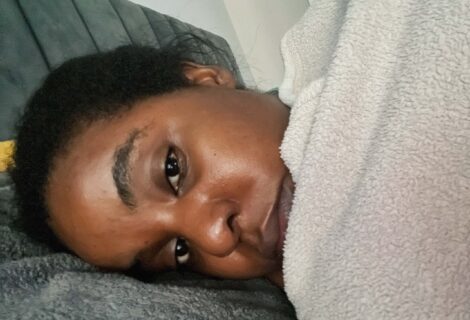Regardless of how much sleep we try to get, we can never seem to get enough. And for Black folks, sleep is a luxury that we can’t always afford. According to a survey by the Centers for Disease Control and Prevention (CDC), 43.5% of Black individuals struggle with sleep compared to 30.7% of white respondents, contributing to sleep inequity across several health categories.
We spoke with Dr. Dayna Johnson, a sleep epidemiologist and Assistant Professor of Epidemiology at Emory University, who sheds light on sleep disparities and sleep inequities within the Black community. Dr. Johnson’s research explores the social, structural, and environmental factors that contribute to poor sleep and the impact of poor sleep on health outcomes such as heart disease, diabetes, and high blood pressure.
How are Black people doing on sleep?
The general consensus is that most adults should get between 7 and 9 hours of sleep in a 24-hour period. Black people, however, are consistently less likely to get at least 7 hours of shut-eye. A Yale-led study published in 2022 found that Black people have the highest prevalence of both short sleep duration and long sleep duration, meaning less than 7 hours and more than 9 hours. And the disparities are the highest for Black women and Black individuals with middle or high income.
Our environment plays a crucial role in our sleep health too. Living in low-income neighborhoods with limited access to affordable and quality ingredients make it challenging to maintain a healthy lifestyle. Unsafe neighborhoods discourage physical activity, contributing to higher rates of obesity. And discrimination and racism alter our stress levels and impact our rest. Not only do these experiences affect us during the day, they invade our nights as we replay the bullshit in our minds.
During sleep, some Black people experience non-dipping blood pressure, which can lead to hypertension and restrict blood flow, putting our health at risk. These factors contribute to changes in hormone levels and higher rates of obesity, a common cause of sleep apnea, within our community. But it’s not just about physical health. Sleep also affects our mental health and decision-making abilities. When we don’t get enough sleep, our hormones become imbalanced, making it harder for us to recognize hunger and fullness cues, leading to subsequent health issues.
What is sleep inequity?
Dr. Johnson defines sleep health as a multidimensional concept, encompassing sleep satisfaction, alertness, timing, efficiency, and duration. Understanding sleep health is vital in addressing these inequities. How satisfied are you with your sleep? Are you alert during the day? What is the optimal timing of your sleep? How much of the night are you sleeping? How long are you sleeping?
Black individuals often struggle with these dimensions. We tend to have later sleep timing and often overrate our sleep quality when measured objectively. Stereotypes, like the notion that Blacks are lazy, also affect how we perceive our sleep satisfaction. Sleep inequality acknowledges that sleep is a privilege, and Black people are more likely to live in disadvantaged areas with increased exposure to factors that disrupt sleep.
What is the financial impact of poor sleep health?
The financial impact of poor sleep health is staggering. The US economy loses billions of dollars annually due to insufficient sleep, with decreased productivity and increased healthcare costs. A report revealed that the US economy can experience up to $411 billion a year loss and 1.23 million working days due to tired ass employees. The estimated annual cost of productivity loss due to disturbed sleep in the US is $2,516 per employee.
Moreover, a decrease in productivity related to tiredness or sleepiness is estimated at 4.5-6%. “Anytime someone has a shorter sleep duration, you’re talking about a loss of performance,” says Dr. Johnson. Employees start missing work, driving a high rate of absenteeism and eventually, unemployment. And stress ain’t cheap. People with sleep disorders tend to have higher healthcare bills as stress eats away at the individual’s physical and mental well-being, weakening our immune systems and making us more susceptible to diseases.
How do we address sleep inequity?
To address sleep deprivation, both individual and systemic changes are necessary. On an individual level, practicing sleep hygiene, such as creating a conducive sleep environment and reducing electronics usage before bed, can help improve sleep. However, systemic changes are equally important. Raising the minimum wage and delaying school start times can provide individuals with better opportunities for adequate sleep. Addressing issues of residential segregation, redlining, and wealth disparities can also contribute to sleep equity, ensuring everyone has an equal chance to achieve optimal sleep.
During another sleep study where Dr. Johnson and other researchers had focus groups in low-income housing, they discussed sleep hygiene. One person said that they couldn’t sleep in a dark home because it made them feel vulnerable. “I have to check my privilege. I hadn’t thought about that,” Dr. Johnson said, “To think you can’t have a dark home because someone may break-in, they may steal something. That affects your safety. And we have to think about things that we can do at a society level to reduce some of these exposures.”
Sleep is not just about beauty rest—it’s about our overall self, inside and out. Prioritizing sleep and working towards sleep equity is essential for the Black community’s survival. Sleep equity means everybody has an equal opportunity to sleep, no matter their race, income, or education. By recognizing and addressing the sleep disparities we face, we can pave the way for a future where quality sleep is a reality for all.




